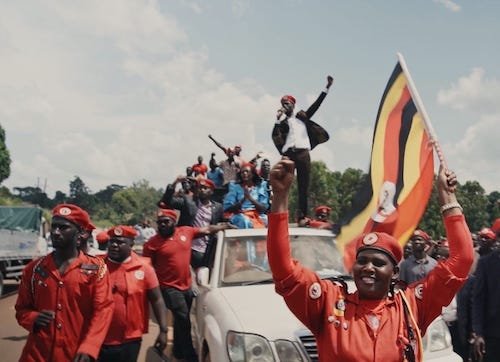Bobi Wine: The People's President
Written by Andreas Babiolakis
The world is aware of reggae icon Bob Marley. They may also know the story of when he was shot in an assassination attempt, and yet he still performed a free protest concert two days later (with the bullet still in him). When asked why, Marley remarked “The people who are trying to make this world worse aren’t taking a day off”, implying that his music was meant to heal and that the world needed it now more than ever. Who you may not know is Ugandan musician, opposition leader, activist, and politician Bobi Wine (born Robert Kyagulanyi Ssentamu), who works just as hard to get his message across to his people while giving them something to smile about with his music. The National Geographic documentary, Bobi Wine: The People’s President, is an extensive look at Wine’s impact, particularly within the vessel of the start of the 2020s. During this time, Uganda was facing an election where Wine — and many others — wanted to remove control from autocratic dictator Yoweri Museveni, who has been the president of Uganda since 1986.
Wine’s music sheds light on political themes (there’s even a song of his about the coronavirus when the pandemic hit), and these tracks — along with his outspokenness — were seen as a threat by Museveni and the Government of Uganda. Thus, Wine faced many challenges as an activist, including imprisonment, torture (which Museveni and the government have denied), and many forms of corruption (for example, Wine’s office was broken into and important files and funds were stolen). Wine doesn’t give up, as he vows to be the next president during the 2021 election. As he wins over more citizens with his music and his protests, Wine becomes what this documentary’s title affectionately refers to as the “people’s president”: an effective leader in the eyes of the public, even if office won’t hold him in such a regard. The documentary places us in the middle of this campaign, including the build-up to it and the aftermath. It also doesn’t shy away from some of the more graphic goings-on, because it’s the very subject matter that Wine would make music about; what good is it to hide the atrocities that an activist is constantly trying to bring awareness to?
Bobi Wine: The People’s President is a strong introduction to an important Ugandan figure and his efforts to help a suffering nation.
I wish the film was a little less safe and traditional in tone, given the intensity of the subject matter and the importance of Wine’s quest; when I say “safe”, I mean the production of the film itself, not what you see (I’d actually warn you that quite a few of the shots captured are graphic). The on-the-note score (not Wine’s music, mind you, but the orchestrations recorded to accompany the feature) and the typical editing compartmentalize an otherwise riveting film into a box that makes it feel like many other documentaries. I feel like Wine and his mission deserve something a little more raw (like the scenes of riots are presented quite literally, and these are shocking to watch; I wish the film was as pure throughout). Nonetheless, Bobi Wine: The People’s President is still a visceral, important film to watch and it is quite thorough in its depiction of Uganda’s present state of turmoil. You can proclaim that the film is one-sided, but the few minutes you spend with President Museveni will quickly remind you why: you must only be taking one side in a debate that is this corrosive and catastrophic when it comes to the well-being of the country. If you aren’t aware of how bad things are in Uganda, this film will get you up to speed. Even if you do, Bobi Wine: The People’s President will introduce you to an activist who is giving one hundred and ten percent into his fight to end a dictatorship that has rid a nation of its potential for decades.
Andreas Babiolakis has a Masters degree in Film and Photography Preservation and Collections Management from Ryerson University, as well as a Bachelors degree in Cinema Studies from York University. His favourite times of year are the Criterion Collection flash sales and the annual Toronto International Film Festival.






